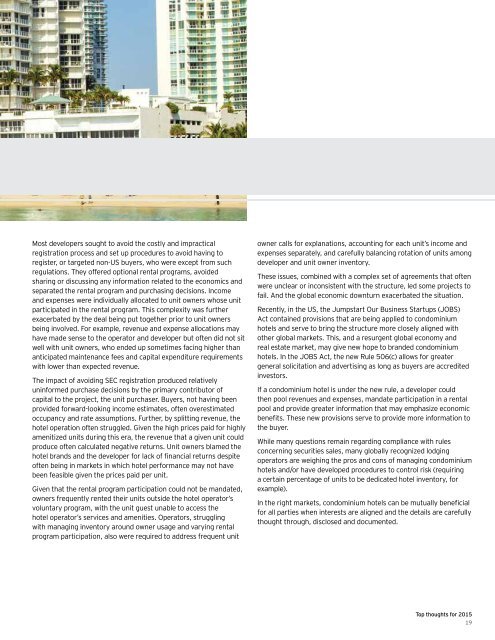ey-global-hospitality-insights-2015
ey-global-hospitality-insights-2015
ey-global-hospitality-insights-2015
You also want an ePaper? Increase the reach of your titles
YUMPU automatically turns print PDFs into web optimized ePapers that Google loves.
Most developers sought to avoid the costly and impracticalregistration process and set up procedures to avoid having toregister, or targeted non-US buyers, who were except from suchregulations. Th<strong>ey</strong> offered optional rental programs, avoidedsharing or discussing any information related to the economics andseparated the rental program and purchasing decisions. Incomeand expenses were individually allocated to unit owners whose unitparticipated in the rental program. This complexity was furtherexacerbated by the deal being put together prior to unit ownersbeing involved. For example, revenue and expense allocations mayhave made sense to the operator and developer but often did not sitwell with unit owners, who ended up sometimes facing higher thananticipated maintenance fees and capital expenditure requirementswith lower than expected revenue.The impact of avoiding SEC registration produced relativelyuninformed purchase decisions by the primary contributor ofcapital to the project, the unit purchaser. Buyers, not having beenprovided forward-looking income estimates, often overestimatedoccupancy and rate assumptions. Further, by splitting revenue, thehotel operation often struggled. Given the high prices paid for highlyamenitized units during this era, the revenue that a given unit couldproduce often calculated negative returns. Unit owners blamed thehotel brands and the developer for lack of financial returns despiteoften being in markets in which hotel performance may not havebeen feasible given the prices paid per unit.Given that the rental program participation could not be mandated,owners frequently rented their units outside the hotel operator’svoluntary program, with the unit guest unable to access thehotel operator’s services and amenities. Operators, strugglingwith managing inventory around owner usage and varying rentalprogram participation, also were required to address frequent unitowner calls for explanations, accounting for each unit’s income andexpenses separately, and carefully balancing rotation of units amongdeveloper and unit owner inventory.These issues, combined with a complex set of agreements that oftenwere unclear or inconsistent with the structure, led some projects tofail. And the <strong>global</strong> economic downturn exacerbated the situation.Recently, in the US, the Jumpstart Our Business Startups (JOBS)Act contained provisions that are being applied to condominiumhotels and serve to bring the structure more closely aligned withother <strong>global</strong> markets. This, and a resurgent <strong>global</strong> economy andreal estate market, may give new hope to branded condominiumhotels. In the JOBS Act, the new Rule 506(c) allows for greatergeneral solicitation and advertising as long as buyers are accreditedinvestors.If a condominium hotel is under the new rule, a developer couldthen pool revenues and expenses, mandate participation in a rentalpool and provide greater information that may emphasize economicbenefits. These new provisions serve to provide more information tothe buyer.While many questions remain regarding compliance with rulesconcerning securities sales, many <strong>global</strong>ly recognized lodgingoperators are weighing the pros and cons of managing condominiumhotels and/or have developed procedures to control risk (requiringa certain percentage of units to be dedicated hotel inventory, forexample).In the right markets, condominium hotels can be mutually beneficialfor all parties when interests are aligned and the details are carefullythought through, disclosed and documented.Top thoughts for <strong>2015</strong>19


